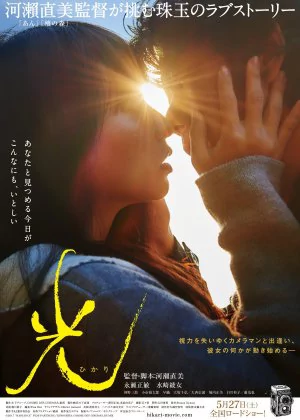Radiance
I'm far from a hardcore Naomi Kawase supporter, but I do follow her work from a little distance and none of her films have disappointed me yet. So once in a while I single out a film that looks interesting enough and give it a try. Radiance [Hikari] was the latest victim, not in the least because it features Masatoshi Nagase. While I'm not familiar enough with her entire body of work, it's by far the best Kawase I've seen and it shows she has the chops to make a (modest) masterpiece.
![screen capture of Radiance [Hikari]](/thumbs/style/site/1200xauto/radiance-1.webp)
Together with Hirokazu Koreeda, Kawase is one of the few Japanese directors with a decent Western arthouse following. I guess her work is a bit more humane and a little less stylized than most of her contemporaries, a combination that tends to sell well here. Personally I tend to prefer more stylized films, which explains my somewhat modest response to most of her films. With Radiance she seems to have found a nice balance between the two though, at least enough to get me fully on board.
I have to say the theme of the film also spoke to me. As a web developer, accessibility is part of our job description and developing websites that are usable for the visually impaired (plus a whole range of other physical disabilities of course) is a greater good that is too often disregarded. While the focus of Radiance isn't really on how blind people get through the day, the characters do use a lot of assistive technology, which offers an interesting (though limited) glimpse into the everyday life of a person with malfunctioning vision.
The story revolves around Misako, who writes assistive narration for films. It's an iterative process where she comes together with a panel of blind people, who then give her feedback on her work. One of those people is Masaya, a photographer who has lost most of his sight. His critiques are always direct and harsh and they often conflict with what the other people in the panel are saying, even so Misako is intrigued by Masaya and as fate forces them to spend some time together, they slowly start to bond.
![screen capture of Radiance [Hikari]](/thumbs/style/site/1200xauto/radiance-2.webp)
Visually Radiance is a clear step up from previous Kawase films. The camera work feels more at ease, more purposeful. There are moments where a lingering camera is allowed to create and bask in atmosphere, something that was largely absent in her earlier work. It's still not the most stylized of films or course, but at least Kawase found a good balance that doesn't intrude on her typical approach, yet still delivers some beautiful shots from time to time.
The soundtrack is less noticeable but that's not really a surprise. Japanese dramas tend to go for soft-tempered, piano-based music and Radiance is no exception. These types of scores have proven their worth and they fit the style and mood well, but they don't really do all that much to elevate the film. For a movie about visually impaired people it definitely could've done more in the way of sound design, but as it stands the soundtrack works and is anything but offensive, so there's little to complain about really.
The cast is impressive, especially the central duo. I've been a lifelong Nagase fan and even though his wild years are clearly behind him, he demonstrates that he can also handle more thoughtful and conflicted characters. Ayame Misaki's performance may be even more impressive though. The way she gives body to her character is extraordinary. She easily holds her own next to Nagase and delivers a strong, layered and heartfelt performance. The secondary cast is nice too, but they're clearly eclipsed by the leads.
![screen capture of Radiance [Hikari]](/thumbs/style/site/1200xauto/radiance-3.webp)
While the next remark may sound a little disrespectful to Kawase's career, I feel Radiance takes her one step closer to being Japan's female alternative to Koreeda. Their careers and styles are quite alike, having both done some documentary work and with the both of them alternating between core human dramas and slightly more stylized films. On the whole I tend to prefer Koreeda's body of work, but with Radiance Kawase is finally able to perfect the recipe to her success and for that I respect her.
Radiance is a fine, accomplished, well-rounded Japanese drama. It's not a film that reinvents the genre, it's not a breathe of fresh air, but it's a beautiful, respectful and endearing film that charms the whole way through. Strong cinematography, two amazing leads and some intriguing drama make for an easy recommendation. It should have no trouble appealing to Kawase fans, but even if you weren't too taken with her earlier work you could probably give this one a chance. It might just change your opinion on her work.
